|
|
 |
 |
|
Norma "Jeanie" Heiden - Ma’s grandmother,
Miller
(or Muller), died in Germany before they came
over to America. According to Ma, she was old anyway and did not
know for sure if she wanted to come over here. Of course, that’s the Rambow’s side.
Wilma (Heiden) Bicking - August landed in New York? How did they get to Monroe?
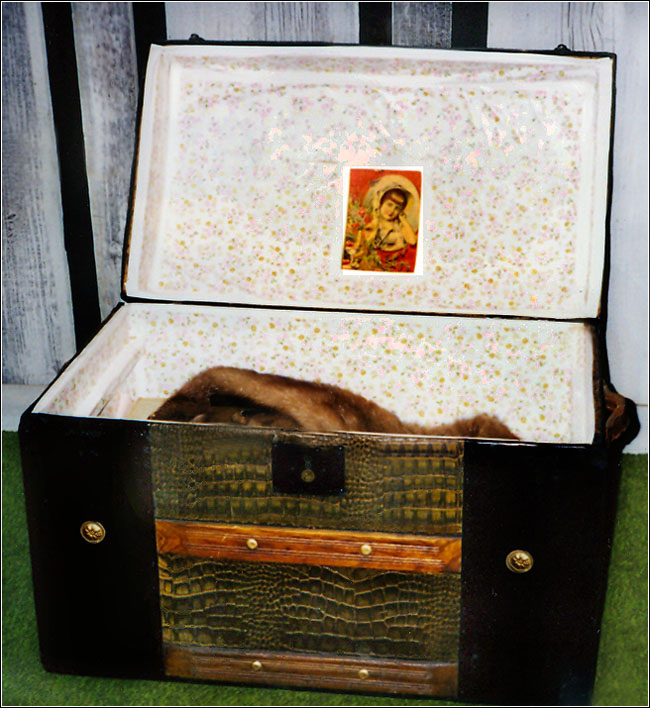 Norma "Jeanie" Heiden - Normally, they had someone over here sponsor them. Norma "Jeanie" Heiden - Normally, they had someone over here sponsor them.
Wilma (Heiden) Bicking - Did the Rambows come on the same ship?
Helma (Heiden) Nickel - The Rambows and Milhans came over about the same time.
[Note: The Rambows came to America in 1874, one year after the Heidens.]
Wilma (Heiden) Bicking - It seems that they all came over about the same time because
they knew somebody here. I’ve also got the cedar chest that Ma’s mother brought over from
Germany. Ma used it as a hope chest.
|
 |
 |
 |
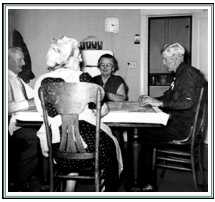 Ralph Heiden - Here are some other pictures of August and his children. I
have several of their marriage pictures too.
We must have got our height in the family from the Rambow side. Ralph Heiden - Here are some other pictures of August and his children. I
have several of their marriage pictures too.
We must have got our height in the family from the Rambow side.
Wilma (Heiden) Bicking - Uncle
Fred Rambow used to come over and play cards all the
time. Uncle Fred would say, “My luck is terrible” and get up and
throw his leg over the top of the chair. Then he would say, “Now we
will play cards!’ He was very tall.
 In
the picture, Mary (Rambow) Heiden has her back to the camera.
Her husband William Carl is to her left and brother Fred Rambow
is to her right. Across the table is Fred's wife, Emma (Westphal).
The picture is from the late 1950s. In
the picture, Mary (Rambow) Heiden has her back to the camera.
Her husband William Carl is to her left and brother Fred Rambow
is to her right. Across the table is Fred's wife, Emma (Westphal).
The picture is from the late 1950s. |
| |
 |
 |
 |
|
Wilma (Heiden) Bicking - I have an old family picture that has a lot of other people
who we cannot identify. Perhaps they are the Rambow branch?
Norma "Jeanie" Heiden - They may have lived in Dundee for a while because Ma got
confirmed in the church in Dundee, I think. But maybe the preacher
from Dundee came down here to do the confirmations.
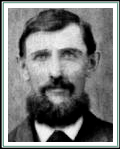 Helma (Heiden) Nickel - I remember when Grandpa Rambow
(right) died, they were living down
there on South Custer Rd. Across from where Lester lived. I was only
about 8 years old when that happened. Helma (Heiden) Nickel - I remember when Grandpa Rambow
(right) died, they were living down
there on South Custer Rd. Across from where Lester lived. I was only
about 8 years old when that happened.
Norma "Jeanie" Heiden & Helma (Heiden) Nickel - Remember when Uncle Herman married Aunt Rike and Pa
married Mary. Brothers married two sisters. Uncle John started going
with Aunt Minnie and Grandma Rambow said, “That’s enough of those
Heidens!”
Wilma (Heiden) Bicking - Perhaps Aunt Minnie would have been a different person if
she had married Uncle John.
(Note: William and
Minnie Rambow were unmarried brother and sister
who lived together on the family farm on South Custer Rd.)
|
 |
 |
 |
|
Wilma (Heiden) Bicking - I never got to know Grandma and Grandpa Heiden but Grandma
Rambow always spoke German.
Helma (Heiden) Nickel - I think she could speak some English but not much.
Wilma (Heiden) Bicking - She used to come and pat us on the head and give us a sugar
cookie. But that was about all.
Mildred (Roggerman) Heiden - Art used to tell that you would go to the Rambow’s house
and sit quietly on the couch all night.
Wilma (Heiden) Bicking - We had orders before we got there to behave. Take a cookie
whether you want it or not
Norma "Jeanie" Heiden - You were not to ask for anything but you would take it if
offered.
Wilma (Heiden) Bicking - She made the best white sugar cookies! She rolled them up
real thin and boy they were good! I often wonder what happened to
the recipe books she had. |
 |
 |
 |
|
Mary Lou (Heiden) Opfermann - When we lived with
Grandma and Grandpa, I can remember
having to come down to the living room whenever there was a thunder
storm.
|
Norma "Jeanie" Heiden - He was always afraid that he wouldn’t be able to get us down
from upstairs if the house was ever hit by lightning. So, in the
middle of the night, if a storm came up, we had to get dressed and
come down and sit together in the living room until the storm was
over.
Wilma (Heiden) Bicking - We had to get dressed since we were not allowed to come
downstairs in our night clothes. That’s the way us kids were raised.
When Marie got married and the first storm came along, she woke
Brick up in the middle of the night and said, “Get your pants on and
get downstairs.” He came into the living room and asked, “What’s wrong? Where are we
going?” Marie said, “Don’t be smart! We’re not going anyplace. It’s
storming.” Brick said, “Oh, for crying out loud.” and went back to bed.
Helma (Heiden) Nickel - It seems like we used to have more serious storms back then
too.
 Mary Lou (Heiden) Opfermann - Remember the balls of lightning that would come right
through the telephone lines and into the house? Mary Lou (Heiden) Opfermann - Remember the balls of lightning that would come right
through the telephone lines and into the house?
Mildred (Roggerman) Heiden - It did that once when we lived at Suchik’s. The lightning
came right through the phone and blew it clear across the kitchen.
It was a wonder that one of the girls wasn’t talking on the phone at
the time.
Wilma (Heiden) Bicking - Edna used to be very concerned about electrical storms. I
used to stay up there with them sometimes.
Mary Lou (Heiden) Opfermann - That was probably because they didn’t have any electric
lights. They just had a kerosene lamp hanging from the ceiling.
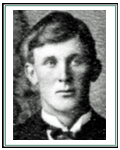 Wilma (Heiden) Bicking - When Henry (Rambow)
(right) would blow that lamp out, it went pitch black in
the house. You could hear the sheep “baa” out in the barnyard in the
night. I used to lay there in the back bedroom saying to myself, “I
hope it gets to be morning soon!” That was really scary. Wilma (Heiden) Bicking - When Henry (Rambow)
(right) would blow that lamp out, it went pitch black in
the house. You could hear the sheep “baa” out in the barnyard in the
night. I used to lay there in the back bedroom saying to myself, “I
hope it gets to be morning soon!” That was really scary.
Norma "Jeanie" Heiden - How about the time while
Helen, Wilma, Marie and Helma were
all still at home. Helma and Marie went out on dates one night.
Helma and Wilma were supposed to sleep together and Helen, Marie and
I shared a bed. I always had to sleep in the middle. We were scaredy cats so we talked Wilma into sleeping with us. When
the others came home, Marie climbed in too so we ended up with four
of us packed like sardines in one bed and Helma by herself in the
other.
|
 |
 |
Aunt Minnie and Uncle
William Rambow |
Mary Lou (Heiden) Opfermann - Norma Miller remembered that Grandma Rambow was a crabby
old lady.
Wilma (Heiden) Bicking - She was very strict evidently. We used to get instruction
before we went there that we were to sit quietly and not ask for
anything.
Norma "Jeanie" Heiden - I remember going to Aunt
Minnie Rambow’s and she would be
sitting there reading the Bible. You didn’t dare say a word until
she was done with her scripture.
(Note: Uncle Will and Aunt Minne Rambow were Mary (Rambow) Heiden’s brother
and sister. They lived together through their adult lives at the
family farm on South Custer Rd.)
Mildred (Roggerman) Heiden - One time Lou and I were wall papering at their house.
Uncle Will Rambow came out of the kitchen and stood in the doorway
because he had dinner ready. Lou said to me, “We might as well go home now because he won’t let
her eat until we leave.”
So, although we had only one strip of paper to hang to finish the
room, we left for the day and came back the next day so they could
eat their dinner. Mary Lou - That was the quietest house I was ever in, I remember.
Wilma (Heiden) Bicking - I used to have to stay there all summer. That was torture.
That’s why I am such a quiet person. (Laughter)
Mary Lou (Heiden) Opfermann - Tick Tok, Tick Tok, that old clock they had was so loud
in the quiet of the room.
Wilma (Heiden) Bicking - At ten minutes to nine every night, Uncle Will would get the
Bible and hand it to Aunt Minnie. She would then read to him in
German until 9 o’clock. And I’d set there real still, never saying a
word. When she was done, he would take the Bible and put it back on the
shelf. Without saying a word, he would go upstairs to bed. There
wasn’t any talking going on at all in the house.
Helma (Heiden) Nickel - There wasn’t anything for them to do. They didn’t have a
radio or anything. After Grandma Rambow died, Herb and I used to go
down there to visit. Uncle Willie just loved to play cards. We would
have a real good time. Edna and Henry used to go there and have a
good time too. The two of them were so used to just sitting
there in the quiet by themselves
Mary Lou (Heiden) Opfermann - After Aunt Minnie died, Uncle Will finally got a
television.
Norma "Jeanie" Heiden - He had a dog that he used to fry two eggs for each day.
Wilma (Heiden) Bicking - I would think that the Rambows and the Heidens came over
from Germany about the same time. They had some of the same type of
furniture. Remember that settee that you had, Helma? Grandpa and
Grandma Rambow had a similar piece of furniture in their house.
Maybe the two families knew each other before they came over from
Germany.
Helma (Heiden) Nickel - Well the Milhans all went to
Bridge School way back then
too.
(Note: Mary (Rambow) Heiden’s mother was a Milhan.)
Wilma (Heiden) Bicking - Were the Rambows on the ship list that you got, Ralph?
Ralph Heiden - No but I don’t have the complete list. I only have a copy of
the first page with the details about the ship and then the page
that lists August
Heiden and his family. They were passengers number
304 through 308 so there were probably 400 or more people on the
boat. I will check it out. (Note: Turns out the Rambows came one
year later in 1874.)
Wilma (Heiden) Bicking - It is funny that they lost that baby, Meta and didn’t name
some other children after her later on.
Norma "Jeanie" Heiden - Helma, is your middle name, Meta?
Helma (Heiden) Nickel - No, its Nettie. That was Nettie Spohr, they were a neighbor
and she stood up for me. She and Aunt Emmie and Uncle
Heinrich "Henry" Heiden
were my Godparents. |
 |
 |
Letters from Germany |
|
Ralph Heiden - The letters are rather sad overall. They were having some
very tough times in Germany then and they were always asking their
Aunt Rika, my great grandmother, for money.
Mildred (Roggerman) Heiden - In one of them, they ask for some money for a house and
some land. Then, later they say they bought the house but needed
more money for the land.
Marie (Heiden) Tommelein - Did they ever help them?
Ralph Heiden - Yes, they sent money when they could and they were always
very appreciative of it and told what the money would buy.
Brick Tommelein - My dad said that at that time, everyone over in Europe
called America “the land of opportunity.”
Ralph Heiden - A lot of people here were helping their relatives then too.
In one of the letters, they ask Rika to send her letters registered
because people were stealing things from mail from America because
those envelopes were likely to have money in them.
Helen (Henning) Heiden - Now are these letters all from Mecklenburg?
Ralph Heiden - Yes. They are from the area called Mecklenburg and the port
city of Rostock. The little villages where our ancestors came from
are the size of
Grape and Maybee and they are about 50 miles from
Rostock.
Helen (Henning) Heiden - From the Hennings, I heard them say that the people were
like slaves back then in Germany. They worked for all these big rich
people. They provided pay for them and took care of them but they
couldn’t get ahead. They didn’t want them to get married because
there were already too many of them to take care of. That is where
the Hennings came from too.
Mildred (Roggerman) Heiden - Didn’t you say that our name should be something other
than Heiden?
Ralph Heiden - Yes, my great grandmother,
Maria Heiden, did not marry the
father of August. So, he took her name rather than his father’s
which was Kannsehr
or Canseyer.
Helen (Henning) Heiden - That’s the same way with my grandpa Henning. Grandma wasn’t
married when she had those two kids.
Ralph Heiden - That was a real common occurrence back then.
Mildred (Roggerman) Heiden - They wouldn’t let you get married unless you could support
yourself.
Ralph Heiden - They technically weren’t slaves but there was nowhere else
for them to go except to another big estate to work and they were
full too. Also, the landowner had the responsibility to take care of
the people on his land so he was stuck too.
That is why they pushed a lot of them to leave and go to America.
Also, the illegitimacy rate went way up because even though they
weren’t legally allowed to marry, people continued to form couples
and do what they needed to do.
Helen (Henning) Heiden - You wonder why the Heidens would come here but they said on
the Henning side that they would send money back to Germany to help
others come here.
Ralph Heiden - But with the Heidens, we don’t know who was here to pave the
way for them. Maybe with this Laas connection, there might be
something to go on.
The
Rambows came a year later. They came here in 1874 and I don’t
know if they came from the same part of Germany as the Heidens. I
haven’t looked into that yet.
I think about the only way we are going to learn why the Heidens
came here is if we stumble onto somebody in one of the other
branches that has an old box of papers up in the attic that someone
gave them long ago. Otherwise, the reason may be lost to history.
[Note: According to
Karen (Berns) Wheaton, the Rambows did come from the
same area in Germany.] |
 |
 |
 |
|
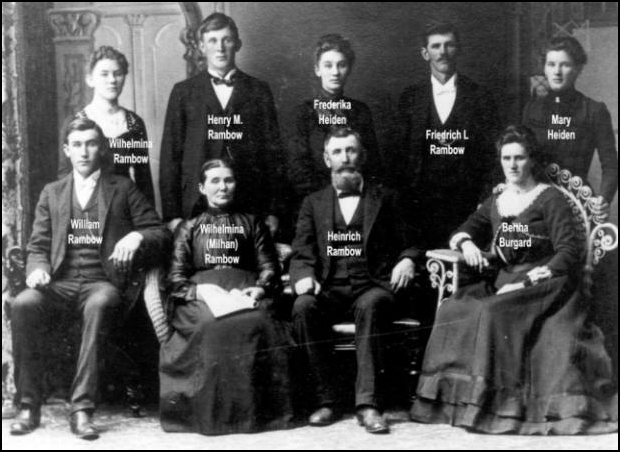
[Looking at family pictures again.]
Helen (Henning) Heiden - Those are the Rambows there.
Uncle Will and Aunt Minnie.
That’s Aunt Rika.
William Frank Heiden - They more or less looked alike. They were all pretty big
women.
Ralph Heiden - It’s interesting to look at Grandma and how she changed over
the years.
Mary Lou (Heiden) Opfermann - She was really a pretty young girl in the Rambow group
picture.
William Frank Heiden - She held up awfully good for someone who had 13 children.
Brick Tommelein - Mother
(Mary) Heiden was a tall woman. It didn’t seem like it at
the time but when you look at her in these pictures, she seems quite
tall.
Mary Lou (Heiden) Opfermann - All the Rambows were big people.
|
 |
|
|
|



